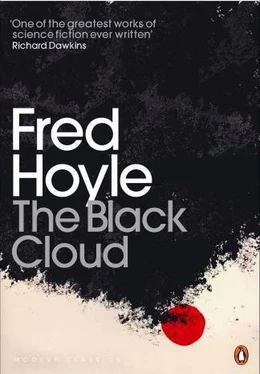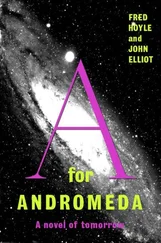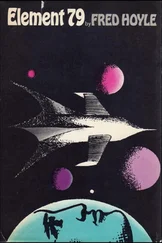Fred Hoyle - The Black Cloud
Здесь есть возможность читать онлайн «Fred Hoyle - The Black Cloud» весь текст электронной книги совершенно бесплатно (целиком полную версию без сокращений). В некоторых случаях можно слушать аудио, скачать через торрент в формате fb2 и присутствует краткое содержание. Жанр: Фантастика и фэнтези, на английском языке. Описание произведения, (предисловие) а так же отзывы посетителей доступны на портале библиотеки ЛибКат.
- Название:The Black Cloud
- Автор:
- Жанр:
- Год:неизвестен
- ISBN:нет данных
- Рейтинг книги:5 / 5. Голосов: 1
-
Избранное:Добавить в избранное
- Отзывы:
-
Ваша оценка:
- 100
- 1
- 2
- 3
- 4
- 5
The Black Cloud: краткое содержание, описание и аннотация
Предлагаем к чтению аннотацию, описание, краткое содержание или предисловие (зависит от того, что написал сам автор книги «The Black Cloud»). Если вы не нашли необходимую информацию о книге — напишите в комментариях, мы постараемся отыскать её.
The Black Cloud — читать онлайн бесплатно полную книгу (весь текст) целиком
Ниже представлен текст книги, разбитый по страницам. Система сохранения места последней прочитанной страницы, позволяет с удобством читать онлайн бесплатно книгу «The Black Cloud», без необходимости каждый раз заново искать на чём Вы остановились. Поставьте закладку, и сможете в любой момент перейти на страницу, на которой закончили чтение.
Интервал:
Закладка:
“Professor Kingsley, I have been trying to put things to you in a fair-minded way, but I feel you are making it rather awkward for me. So it becomes necessary to deal plainly. I need hardly tell you that if this story of yours becomes public there will be very grave repercussions indeed.”
Kingsley groaned.
“My dear fellow,” said he, “how very dreadful. Grave repercussions indeed! I should think there will be grave repercussions, especially on the day that the Sun is blotted out. What is your Government’s plan for stopping that?”
The Home Secretary kept his temper with difficulty.
“You are proceeding on the assumption that the Sun will be blotted out, as you call it. Let me tell you with frankness that the Government has made inquiries and we are not at all satisfied with the accuracy of your report.”
Kingsley was wrong-footed.
“What!”
The Home Secretary followed up his advantage.
“Perhaps that possibility had not occurred to you, Professor Kingsley. Let us suppose, I say let us suppose , that the whole matter comes to nothing, that it turns out to be a storm in a tea-cup, a chimera. Can you imagine what your position would be, Professor Kingsley, if you were responsible for public alarm over what turned out to be a mere mare’s nest? I can assure you very solemnly that the matter could only have one ending, a very serious ending.”
Kingsley recovered slightly. He felt the explosion growing within him.
“I cannot say how grateful I am at your concern for me. I am also not a little surprised at the Government’s evident penetration into our report. Indeed, to be frank, I am astonished. It seems a pity that you cannot display an equal penetration into matters with which you might more properly claim a less amateur acquaintance.”
The Home Secretary saw no reason to mince matters. He rose from his chair, took up his hat and stick, and said:
“Any revelations you make, Professor Kingsley, will be regarded by the Government as a serious contravention of the Official Secrets Act. In recent years we have had a number of cases in which scientists have set themselves above the law and above public interest. You will be aware of what happened to them. I will wish you good-day.”
For the first time Kingsley’s voice became commanding and sharp. “And may I point out, Mr Home Secretary, that any attempt by the Government to interfere with my freedom of movement will quite certainly destroy any chance you may have of maintaining secrecy? So long as this matter is not known to the general public you are in my hands.”
When the Home Secretary had gone Kingsley grinned at himself in the mirror.
“I played that part rather well, I think, but I wish it hadn’t had to happen in my own rooms.”
Events now moved quickly. By evening a group of M.I.5 men arrived in Cambridge. Kingsley’s rooms were raided while he was dining in the College Hall. A long list of his correspondents was discovered and copied. A record of letters posted by Kingsley since his return from the U.S. was obtained from the Post Office. This was easy because the letters had been registered. It was found that of these only one was still likely to be in transit, the letter to Dr H. C. Leicester of the University of Sydney. Urgent cables were sent out from London. This led within a few hours to the letter being intercepted at Darwin, Australia. Its contents were telegraphed to London, in code.
At ten o’clock sharp the following morning a meeting was held at 10 Downing Street. It was attended by the Home Secretary, by Sir Harold Standard, head of M.I.5, Francis Parkinson, and the Prime Minister.
“Well, gentlemen,” began the Prime Minister, “you have all had ample opportunity to study the facts of the case, and I think that we can all agree that something must be done about this man Kingsley. The letter sent to the U.S.S.R. and the contents of the intercepted letter give us no alternative but to act promptly.”
The others nodded without comment.
“The question we are here to decide,” went on the Prime Minister, “is the form that such action shall take.”
The Home Secretary was in no doubt of his own opinion. He favoured immediate incarceration.
“I do not think we should take Kingsley’s threat of public exposure too seriously. We can seal up all the obvious leaks. And although we might suffer some damage, the amount of damage will be limited and will probably be far less than if we try any form of compromise.”
“I agree that we can seal up the obvious leaks,” said Parkinson. “What I am not satisfied about is that we can seal up the leaks that are not obvious. May I speak frankly, sir?”
“Why not?’ queried the Prime Minister.
“Well, I was a little uneasy at our last meeting about my report on Kingsley. I said that many scientists regard him as clever but not altogether sound, and in that I was reporting them correctly. What I didn’t say was that no profession is more consumed by jealousy than the scientific profession, and jealousy will not allow that anyone can be both brilliant and sound. Frankly, sir, I do not think there is much chance of the Astronomer Royal’s report being in error in any substantial particular.”
“And where is all this leading?”
“Well, sir, I have studied the report pretty closely and I think I have picked up some idea of the characters and abilities of the men who signed it. And I simply do not believe that anyone of Kingsley’s intelligence would have the slightest difficulty in exposing the situation if he really wanted to. If we could draw a net round him very slowly over a period of several weeks, so slowly that he suspected nothing, then perhaps we might succeed. But he surely must have anticipated that we might make a grab. I’d like to ask Sir Harold about this. Would it be possible for Kingsley to spring a leak if we put him under sudden arrest?”
“I fear what Mr Parkinson says is pretty well correct,” began Sir Harold. “We could stop all the usual things, leakages in the press, on the radio, our radio. But could we stop a leakage on Radio Luxembourg, or any one of the scores of other possibilities? Undoubtedly yes, if we had time, but not overnight, I’m afraid. And another point,” he went on, “is that this business would spread like wildfire if it once got out even without the help of newspapers or radio. It’d go like one of these chain reactions we hear so much about nowadays. It’d be very difficult to guard against such ordinary leaks, because they could occur anywhere. Kingsley may have deposited some document in any of a thousand possible places, with an arrangement that the document be read on a certain date unless he gave instructions to the contrary. You know, the usual sort of thing. Or of course he may have done something not so usual.”
“Which seems to concur with Parkinson’s view,” broke in the Prime Minister. “Now, Francis, I can see you have some idea up your sleeve. Let’s hear it.”
Parkinson explained a scheme that he thought might work. After some discussion it was agreed to give it a trial, since if it would work at all it would work quickly. And if it did not work there was always the Home Secretary’s plan to fall back on. The meeting then broke up. A telephone call to Cambridge followed immediately. Would Professor Kingsley see Mr Francis Parkinson, Secretary to the Prime Minister, at three that afternoon? Professor Kingsley would. So Parkinson travelled to Cambridge. He was punctual and was shown into Kingsley’s rooms as the Trinity clock was striking three.
“Ah,” murmured Kingsley as they shook hands, “too late for lunch and too early for tea.”
“Surely you’re not going to throw me out as quickly as all that, Professor Kingsley?’ countered Parkinson with a smile.
Читать дальшеИнтервал:
Закладка:
Похожие книги на «The Black Cloud»
Представляем Вашему вниманию похожие книги на «The Black Cloud» списком для выбора. Мы отобрали схожую по названию и смыслу литературу в надежде предоставить читателям больше вариантов отыскать новые, интересные, ещё непрочитанные произведения.
Обсуждение, отзывы о книге «The Black Cloud» и просто собственные мнения читателей. Оставьте ваши комментарии, напишите, что Вы думаете о произведении, его смысле или главных героях. Укажите что конкретно понравилось, а что нет, и почему Вы так считаете.












